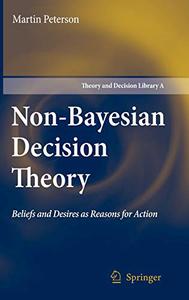
Non-Bayesian Decision Theory: Beliefs and Desires as Reasons for Action by Martin Peterson
English | PDF | 2008 | 175 Pages | ISBN : 1402086989 | 2.3 MB
For quite some time, philosophers, economists, and statisticians have endorsed a view on rational choice known as Bayesianism. The work on this book has grown out of a feeling that the Bayesian view has come to dominate the academic com- nitytosuchanextentthatalternative,non-Bayesianpositionsareseldomextensively researched. Needless to say, I think this is a pity. Non-Bayesian positions deserve to be examined with much greater care, and the present work is an attempt to defend what I believe to be a coherent and reasonably detailed non-Bayesian account of decision theory. The main thesis I defend can be summarised as follows. Rational agents m- imise subjective expected utility, but contrary to what is claimed by Bayesians, ut- ity and subjective probability should not be de?ned in terms of preferences over uncertain prospects.
For quite some time, philosophers, economists, and statisticians have endorsed a view on rational choice known as Bayesianism. The work on this book has grown out of a feeling that the Bayesian view has come to dominate the academic com- nitytosuchanextentthatalternative,non-Bayesianpositionsareseldomextensively researched. Needless to say, I think this is a pity. Non-Bayesian positions deserve to be examined with much greater care, and the present work is an attempt to defend what I believe to be a coherent and reasonably detailed non-Bayesian account of decision theory. The main thesis I defend can be summarised as follows. Rational agents m- imise subjective expected utility, but contrary to what is claimed by Bayesians, ut- ity and subjective probability should not be de?ned in terms of preferences over uncertain prospects.
On the contrary, rational decision makers need only consider preferences over certain outcomes. It will be shown that utility and probability fu- tions derived in a non-Bayesian manner can be used for generating preferences over uncertain prospects, that support the principle of maximising subjective expected utility. To some extent, this non-Bayesian view gives an account of what modern - cision theory could have been like, had decision theorists not entered the Bayesian path discovered by Ramsey, de Finetti, Savage, and others. I will not discuss all previous non-Bayesian positions presented in the literature.
Recommend Download Link Hight Speed | Please Say Thanks Keep Topic Live
Download From 1DL
https://1dl.net/vctd5zbo5on9/yp5dw.N.D.T.B.a.D.a.R.f.A.R.rar.html

https://rapidgator.net/file/ef902313cc768585691ca40e4528495b/yp5dw.N.D.T.B.a.D.a.R.f.A.R.rar.html

https://nitroflare.com/view/245B796D89BD092/yp5dw.N.D.T.B.a.D.a.R.f.A.R.rar

https://uploadgig.com/file/download/09a12c9F1f64f535/yp5dw.N.D.T.B.a.D.a.R.f.A.R.rar
Links are Interchangeable - No Password - Single Extraction
